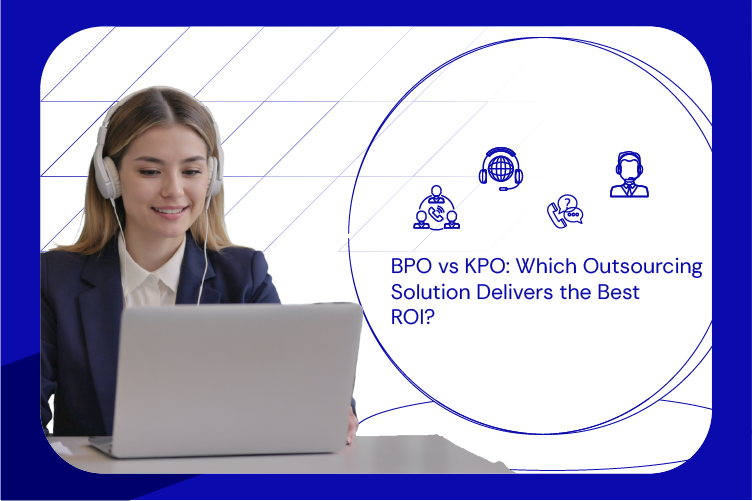Choosing between KPO and BPO depends on your company’s operational maturity and growth goals. BPO handles routine tasks. Whereas, KPO delivers data-backed, strategic support that directly influences business decisions. By choosing the right model, you can boost ROI through cost savings and better focus on core functions.
“Outsourcing” is a business decision where you delegate non-core tasks to another company instead of doing it in-house. Today, many businesses perform outsourcing for tasks like:
- Customer service
- Marketing
- Technical support
- HR, and more
But how? Generally, there are two common types of outsourcing – BPO and KPO. Both processes differ in the type of work they handle, the skill level required, and the value they add to a business.
Are you planning to outsource too? In this article, let’s learn about KPO vs BPO, which is better and study some latest trends prevailing in both these industries. Lastly, we will understand which outsourcing solution can offer you the best ROI.
What is BPO (Business Process Outsourcing)?

BPO means contracting routine or non-core business functions to an external partner. These tasks do not require deep expertise. Most companies do this to reduce costs and focus on their main business. Some common examples include:
- Running a customer call center
- Managing payroll and employee records
- Providing basic tech support
- Handling recruitment processes
You can observe that these services are task-based and do not require much specialised knowledge. Most brands leverage BPO to reduce expenses and improve turnaround time while keeping internal teams focused on product and growth.
BPO Industry Trends 2025

Studies show that the global BPO market is estimated at $347.95 billion in 2025 and projected to reach $840 billion by 2034 (CAGR 10.3%). In this growth, North America held a major 36% market share in 2024. If we specifically talk about the U.S. market, it is expected to grow at a CAGR of 9.6% from 2025 to 2030.
But why? What’s causing this popularity? It’s due to the favourable BPO industry trends. Study them below:
1. Increasing Adoption of Multiple Communication Channels
Most businesses are now adopting omnichannel messaging solutions. Using them, they are providing customer support through:
- Phone
- Outsourced Email Support
- Chat
- Social media support
- Live chat service for website
Since most businesses do not have the expertise and workforce to handle all these channels together, they outsource this work to leading agencies, like Atidiv. Specialists like Atidiv help in messaging through AI-driven routing and real-time analytics, improving response times and CSAT.
2. Rising Industry-Specific Services
Businesses no longer want just cheap labor from BPOs! They now look for partners who understand their specific industry, such as:
- Healthcare
- Finance
- E-commerce
BPOs are investing in trained talent to deliver contextual CX.
3. The Need for More Automation
Nowadays, leading BPO companies, like Atidiv, use the latest AI models and software to automate basic tasks. These tools:
- Speed up work
- Reduce mistakes
- Use data to give better service
Also, they study customer behaviour to suggest the next steps or predict problems. Leading firms like Atidiv deploy AI for sorting tickets, workflow automation and predictive insights which results in reduced errors and boosting resolution.
What is KPO (Knowledge Process Outsourcing)?

KPO stands for Knowledge Process Outsourcing. Delegating specialized, analysis intensive work to external experts. Usually, these services support decision-making or planning. Most companies perform such an outsourcing when they do not want to hire specialised full-time staff.
Some common examples are:
- Doing market or business research
- Analysing financial or customer data
- Writing legal documents or contracts
- Creating reports for investment or strategy
You can observe that these tasks need trained professionals and involve judgment, analysis, or interpretation. KPO helps businesses gain strategic insights without maintaining large in-house expert teams.
KPO Industry Trends 2025

The global KPO process outsourcing market is expected to reach $124 billion by 2025 and $169 billion by 2032 (CAGR ≈ 16–17%).
Again, this strong growth and popularity are due to favourable KPO industry trends. Let’s check them out:
1. Growing Use of Digital Tools and Data Analysis
Businesses are now hiring KPO companies to handle advanced tasks like:
- Analysing large sets of data
- Building digital strategies
- Letting them use advanced technologies like
- AI
- Cloud systems
- The Internet of Things (IoT)
By offering these services, KPOs let companies study customer behavior and make better business decisions based on real data. Atidiv’s CX analytics team uses machine learning to get customer insights that drive retention and sales.
2. Increasing Use of AI for Complex Work
KPO firms are using artificial intelligence and machine learning to perform difficult tasks that once needed expert staff. AI is now being used for:
- Studying customer feedback
- Combining research results
- Making predictions
Here, the human workforce focuses on drawing conclusions and planning next steps.
3. Rising Popularity of Knowledge-as-a-Service (KaaS)
KaaS models let companies access specialist skills on demand without hiring. Instead, you access expert knowledge or tools when you need them. It works like a subscription.
For example,
- You, as a business owner, can log in to a platform.
- Then, use a ready-made data analysis tool.
- Or, you can ask for help from a finance or legal expert (without hiring one full-time).
Additionally, KPO companies are now being paid based on the results they deliver and not just the number of hours worked. For example, instead of charging for 100 hours of data research, they may charge based on how much that research improves sales or cuts costs.
Both KaaS and this outcome-based approach are significantly increasing the popularity of KPO process outsourcing.
Related success: How Atidiv Delivered 80% Time Savings, 50% Cost Reduction, and 99% Accuracy for an NYC Start-Up.
Major BPO vs KPO Differences You Must Know!

If your business needs help with basic support tasks, BPO is the right fit. Whereas, if your work needs expert analysis or professional input, KPO may be better. Both these outsourcing types cut costs and let you focus on your core business.
For more clarity, let’s understand the BPO vs KPO differences in detail through the table below:
| Aspect | BPO | KPO |
| Type of Work | Basic and routine tasks | Skilled and knowledge-based tasks |
| Task Complexity |
|
|
| Staff Skill Level | General staff with basic training | Experts with specialised knowledge |
| Talent Required | Since it is process-oriented, only basic skill sets are required | Highly trained professionals work on KPO process outsourcing. |
| Focus Area | Operational support |
|
| Customisation | Limited as processes are mostly fixed | Highly customised solutions are delivered as per the client’s needs |
| Client Engagement |
|
|
| Examples |
|
|
KPO vs BPO – Which is Better?

Some reports show that outsourcing can deliver ROI up to 231%. But, please realise that Return on Investment (ROI) from outsourcing is no longer just about saving money but in speed, agility and strategic value!
Today, businesses measure ROI by looking at five key areas:
- Cost Savings: Reducing employee and office expenses
- Access to Talent: Getting expert help without hiring full-time staff
- Flexibility: Scaling work up or down quickly
- Faster Output: Launching services or products quicker
- Strategic Benefits: Allowing your own team to focus on the core business
When BPO Gives Better ROI
BPO gives better ROI when your business has routine and repetitive work, such as:
- Customer service
- Payroll
- Data entry
- Tech support
Since these tasks require only basic-skilled workers, back office business process outsourcing can cut down your costs and let you handle more volume. It is ideal if you are focused on running business operations at a low cost.
When KPO Gives Better ROI
KPO process outsourcing gives higher ROI if your business needs:
- Long-term ROI through better decisions and innovation
- Analytical projects that require expert judgment or data interpretation
- Perfect for CX leaders and operations heads who need predictive insights and performance optimization
Leading KPO firms, like Atidiv, develop strong business strategies for you and let you stay competitive. Though the cost of KPO is higher, the long-term returns are greater because it directly supports business growth and innovation.
Example: How Our Client Saved $450K Annually and 65% in Employee Costs.
So, BPO vs KPO, Which is Better? Final Verdict!
KPO gives higher ROI in the long run, but only if your business needs:
- Expert knowledge
and
- Decision-making support
BPO delivers quick & stable ROI for process-driven tasks, while KPO offers higher strategic returns over time.
If you operate on a small scale, you can start with BPO for support tasks. Later, you can move to KPO when planning to grow or compete in complex areas like:
- AI-powered customer support
- Voice telco services
- Digital marketing
- Research
- Finance
- Digital customer experience solutions
Atidiv’s digital CX solutions combine both approaches, transactional efficiency and knowledge-based optimization to deliver measurable ROI for consumer and D2C brands.
See proof here: Enabling $20M+ Savings and 95%+ Quality for a Leading Business Aggregator.
Picked The Winner in BPO vs. KPO Battle? Now, Choose Atidiv As Your Outsourcing Partner!
The decision, KPO vs BPO, which is better, entirely depends on your business goals. BPO offers stable ROI for high-volume and routine tasks. It cuts costs and improves efficiency. On the other hand, KPO process outsourcing delivers more long-term ROI when you need services like expert knowledge and strategic decision-making.
Ultimately, both models serve different needs and can complement each other. Are you looking for a reliable BPO or KPO partner? Struggling to deliver memorable customer experiences?
Outsource your customer support to a CX specialist like Atidiv! Our expert team offers:
- Omnichannel messaging solutions
- Voice customer care
- Social media support
- Live chat service for website
- Inbound call center services and outbound call center services
Atidiv delivers CX efficiency with up to 60% cost savings and verified ROI tracking.
For inbound sales, Atidiv also uses smart call routing and speech analytics. This lets us connect customers to the right agent faster! Partner with Atidiv today and offer your customers exceptional CX.
FAQs On BPO vs KPO Which Solution Delivers Better Result
1. How do I decide between BPO and KPO for my business?
If your tasks are repetitive and cost-driven (like customer support or data entry), go for BPO. If your work involves expert analysis or research (like market studies or financial insights), KPO is better.
Ideally, the answer, KPO vs BPO, which is better, depends on the task complexity and required skill.
2. Will outsourcing affect the quality of my customer service?
Not if you choose the right partner! Reliable BPO/ KPO providers like Atidiv use:
- Trained staff
- Advanced technologies like AI
- Omnichannel support systems
All these techniques let us maintain high-quality service. Through our back office outsourcing services, you can significantly improve CX with faster responses and 24/7 availability. Experienced partners like Atidiv maintain 98% QA scores and 4.8 CSAT ratings through AI-driven workflows and domain expertise.
3. How secure is my business data with outsourcing partners?
Trusted partners follow strict data protection policies. They use:
- Encryption
- Access controls
- Compliance standards like GDPR
As a business owner, you should always choose a provider with a strong data security track record, like Atidiv. Such a smart choice lets you protect customer information and business confidentiality. Atidiv follows GDPR and SOC 2 standards, enforcing encryption and strict access controls.
4. How quickly can I see ROI from outsourcing?
BPO shows immediate ROI through cost cuts whereas KPO builds compounded ROI through better strategy and innovation.

